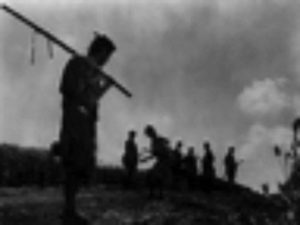
Happy the Man
Happy the man, and happy he alone,
He who can call today his own:
He who, secure within, can say,
Tomorrow do thy worst, for I have lived today.
by John Dryden (1631-1700)
To the untutored eye metastasized bladder cancer eats a man from the inside out, leaving skin covered bones.
My father, 93, lay in the hospice bed in a Twilight of the Lost. Down the hall, a cellist played Bach’s Suite Number 1 for cello to another soul facing eternity, Mrs. Z. The music halted, started up again, halted, then went on for a spell. Mrs. Z would pass early on while my father lingered. Periodically he’d clasp onto his catheter and needed to be reminded he could relieve himself any time. A urinary drainage bag hung from a bed rail with a clear plastic tube snaking under the sheets. The liquid a deep orange.
Originally, they gave him 10 to 14 days. By the sixth week of his ordeal he’d gone from a mildly confused very thin fellow to a slurring cadaver, barely conscious. Waking up for periods of time—blindly looking for a Styrofoam water cup that wasn’t there. Or reaching out into thin air to some past vision only he could see. Eyes dilated to blindness, at the end we kept the room half dark, but with a bar of light from a window.
The thrum of an air conditioner couldn’t mask several violent shouts down the hall. Another patient’s voice, terrified, and confused. My father raised his head for the first time in days and tried answer the cry for help. His neck strained, alert. No answer to give.
I went to see him almost every day. Mornings were strangely peaceful, with the routine bustle of the staff. It took three hefty women to manage my father onto a toilet the last time they tried. Later, the adult diaper – a moment of argument and then resigned acceptance – the body finally dependent upon the swaddling needs of the institution over the needs of the man.
There’s an immense amount of cleaning for those who soil themselves—gowns and gloves and antiseptics. Even with all the efficiency, I wiped a dried smear off a plastic foot rail on an otherwise spotless white Disney Land care-assist hospital bed. The mark of haste in an otherwise thankless job. The smear more like dried ancient paint, no scent – as though what came out was purer than what remained behind.
Before long, the six weeks turned into a living Conrad novel – a mélange of Lord Jim and Heart of Darkness where New York City became the pestilent continent of no return, oppressive heat, the noise and babble of too many in too small a space, surrounding the forbidden hospice temple.
There were far better memories.
Our shared past, a refuge of summers on Long Island in the early 1960s.
The Big Duck building you passed on the way to the Hamptons, the endless farms—the backyard of the tiny Hampton cottage we rented for a few hundred dollars. Beside the it lay a knotty field with cows that came up to say Hello. The single electric wire of an electric cattle fence barely gave you a nudge, we touched it with blades of grass to feel its little sizzle.
And no crowds – beaches nearly empty where we’d go for “swim walks”. Miles of bare sand under a blue sky seeing only a bright red kite floating over the surf . . .
The lost world of childhood. The face that tucked you in. And sang lullabies, Battle Hymn of the Republic, in a deep stirring voice – where the grapes of wrath are stored. Now my face hovered above his. The natural order of the universe twisting the phrase — the child is the father to the man – into an ouroboros.
“My End is in My Beginning.”
As the weeks passed and the skeleton grew, it dawned on me Dad was standing on the shore of the river Styx. Haggling with Charon the Ferryman over the price of the fare.
At length a price was fixed and final transfer made on pale, drawn, parchment dry skin. When dead – his mouth gaped open in a frozen shout, still contesting. Mute defiance at the audacious power that came for him.
To Charon, I say, let us not meet again, until the appointed hour. My father’s last words, spoken to the darkened Hospice room to my ears alone—shall keep you from my shore:
“We are the lucky ones . . .”
Featured photo: Charon, the Ferryman of Hell by Gustave Dore and Finis Ab Origine Pedet (My End is My Beginning)- Public Domain. Additional photos: Paladin’s personal collection, and The Big Duck.

This is vivid in imagery, and filled with the love you have for your father. Beautiful tribute in what is a painful time.
I try for Vivid. Thank you.
The hardest time you spend with a loved one is the last time – when you know it is the last time.
All too frequently, the hardest time to live with is the last time you spent with a loved one – when you didn’t know it was the last time.
There’s no easy way.
Your poignant writing brought us all right to your father’s bedside to share the last weeks of his life with you. And to the more peaceful times at the beach and farm fields with your remembrances of happier times in your childhood. A lifetime of memories flows through our minds when it’s time to say goodbye. Thank you for sharing your thoughts with us as you grieve.
My condolences to you on the passing of your dad. I’m sure he will be missed by many.
Indeed…
24 Comments